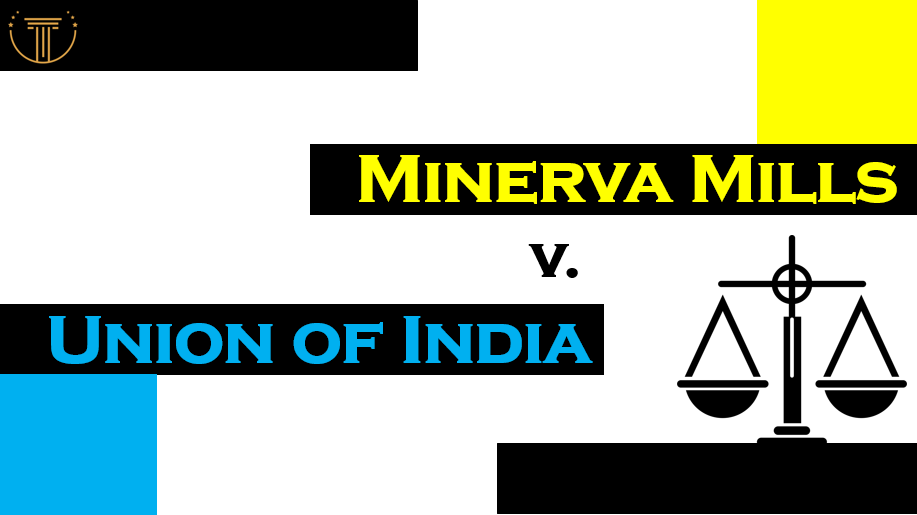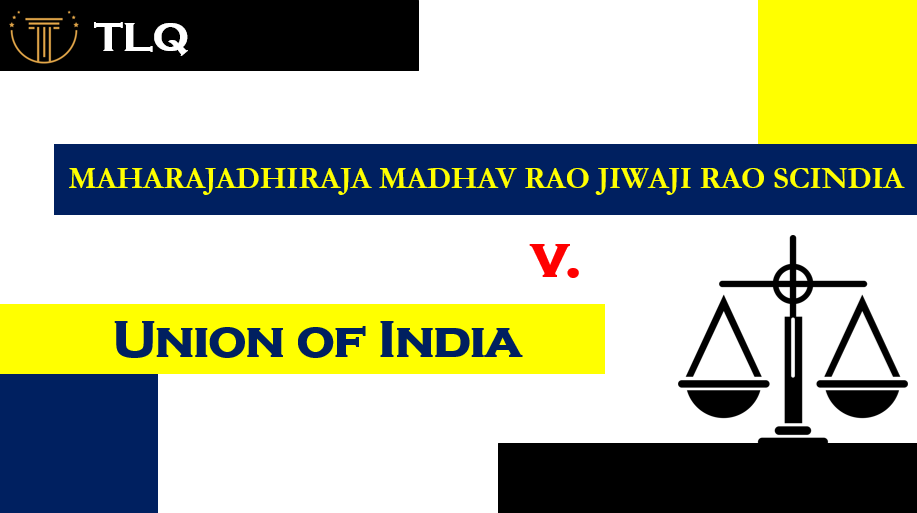Published On: 7th February, 2024
CITATION: (2016) 5 SCC 1
DATE OF JUDGEMENT: 16 October 2015
INTRODUCTION:
The judiciary on all levels has the responsibility of delivering justice and simplifying substantial points of law to make justice accessible to all. This would neither be possible if the judiciary is dependent on the political and economic forces taking a course in the economy nor when there is a hunger for power to influence and mould the law as per one’s own will and wish. Independence is a basic structure for the constitution to work free of any ulterior motives and to maintain the sanctity and integrity of the honourable judiciary which is to say that those who occupy the higher positions should be appointed carefully keeping in mind their qualifications and their past work rather than just seniority and recommendation of one or two persons.[1]
This is a landmark judgement of the Supreme Court which has dealt with the issue of appointment and transfer of judges in higher judiciary for the fourth time. Before this judgement was passed, three previous cases have also dealt with the same issue as were known as the first[2], second[3] and third[4] judges’ cases. These cases have not just dealt with the issue of appointment and transfer of judges but also with the independence of the judiciary, separation of powers, basic structure doctrine, the primacy of opinion in consultation and introduction of the collegium system. However, in this case, these sub-issues were discussed again to address the main issue at hand which was the validity of a new act and amendments enacted by the legislature to provide a framework for such appointment, transfer, primacy and consultation.
The five-judge bench decided this case in a ratio of 4:1 and the one and only dissenting opinion was provided by Justice Chelameswar. The aim of this case commentary is to analyze the judgement in light of the provisions of the act enacted and to critically analyze the interpretative aspect of the law dealt with by Honorable Justice Chelameswar.
BRIEF FACTS
- The case stems from the judgements passed in the second and third judges’ cases where the collegium system was introduced for the appointment and transfer of judges. The word ‘consultation’ was read in a manner to provide primacy to the participative recommendation provided by the Chief Justice of India and other Supreme Court and High Court judges in matters of appointment of judges in the higher judiciary.[5]
- With the introduction of this collegium system, the Legislature took no time in introducing the Constitution (Ninety-Ninth Amendment) Act, 2014[6] and National Judicial Appointments Commission Act, 2014[7] with a claim that the amendment and act are more accountable and transparent than the collegium system for appointment and transfer of judges.
- The validity of both the act and amendment so made in the Constitution of India was challenged here as being unconstitutional and a breach of the independence of the judiciary.
ISSUE:
- Whether the Constitution (Ninety-Ninth Amendment) Act, 2014 and National Judicial Appointments Commission Act, 2014 are constitutionally valid?
CRITICAL ANALYSIS:
Petitioner’s and respondent’s contention:
The highlights of the petitioner’s arguments are that the procedure laid down in both the legislation and amendment made in the form of Articles 124A to 124C are interfering with the independence of the judiciary, the basic structure doctrine and the separation of powers as well. They contend that the matters related to the judiciary should be left with them and that the mechanism adopted in the second and third judges’ cases of following collegium and primacy should be revived.
On the other hand, the respondents are hell-bent on getting their acts enforced in order to make new judicial appointments. Their contention that the independence of the judiciary is not harmed if these acts are enforced was even accepted by Justice Chelameswar who gives a dissenting opinion and holds the acts valid and constitutional.
Disputed provisions of the act: –
- Section 5(1)[8] of the NJAC Act, provides for the ‘deeming fit’ of the person recommended for the position of being a judge of a High Court or the Supreme Court. This according to the majority of four was a less efficient guideline as it meant to determine only the physical and mental fitness of the candidate, not the meritorious fitness which will compromise the effectiveness and efficiency of the people occupying positions in the higher judiciary.
- Section 5(2)[9] and 6(1)[10] have been interpreted and held to be arbitrary as it provides for a particular batch of judges of one single High Court to be the only ones who will be appointed to the Supreme Court by taking into consideration the rule of seniority. This was held to be an arbitrary act and violated even Article 14[11] as it does not provide an equal opportunity for every candidate of a certain merit to compete fairly and freely.
- The composition of the NJAC Committee was to have the Chief Justice of India, two senior judges alongside CJI, two eminent persons and the Union Minister of Law and Justice. The eminent persons would be appointed by a committee consisting of the CJI, Prime Minister and the leader of the opposition in Lok Sabha which was held by all four judges that it will result in arbitrariness as it will give executive and legislature dominant powers and it is highly likely to influence the appointment procedure. Moreover, giving the Executive and Legislature a say in judicial appointments makes the Judiciary not a colleague but a subordinate thereby breaching the independence of the judiciary and the basic structure doctrine.[12] [13] [14]
Dissent by Justice Chelameswar:
- Justice Chelameswar in his judgement says that the term ‘consultation’ in Article 124 was never meant to be a concurrent consultation which is to be definitely accepted by the President, in fact, it should be read in its literal sense that as a suggestion merely which is not binding on the President to accept. The literary rule of interpretation says that you should read a word as it has its meaning in the origin of language and in a restricted sense.
- He also says that a judicial appointment is surely a matter of great concern and should take place without any bias or political agenda but the fact that primacy to the CJI in the consultation process is given just because he is the CJI also, is not what the lawmakers intended. Their intention was to divide power equally rather than granting unfettered powers to be misused in the name of what the intent of the lawmakers was and whatnot.
- He also held that the independence of the judiciary is sure a critical aspect to ensure free and participative justice but matters of appointment and transfers are strictly administrative actions and should be left to them to handle.
- Justice Chelameswar throughout the judgement is seen to be not a big fan of the idea of purposive or liberal interpretation as he says that “giving a liberal approach would only divert us from the matter” and also goes on to give a strict meaning to the term “consultation” to be a process as what the word suggests- only consulting and no binding.
Revival of collegium: –
The majority after holding the acts unconstitutional ordered for the continuance and revival of the collegium system of appointment of judges in the High Court and Supreme Court. The collegium was described in the third judges’ case as being a participative consultation process wherein a committee of 5 for the Supreme Court and a committee of 3 for the High Court was given the power to consult among themselves on the merits of the recommended candidate and forward the consultation to President.
CONCLUSION:
A dissenting opinion is sure a sign of bravery and free and fair judicial decision-making making and the points presented by Justice Chelameswar, giving his dissent is to a great extent acceptable if we do not wish to move from the literal interpretations of law, but since we have already seen some great advancements in the field of law, it does not hurt to accept that the intent of lawmakers in 1950 may not align with the contemporary problems and issues in the society and any decision provided disregarding the dynamism the society screams will be a great violation of human rights.
This is true even with respect to the independence that the judiciary should enjoy the same way parliamentary proceedings are not questioned in the courts and principles of natural justice are outrightly ignored under administrative law. We can provide a set standard of independence to the judiciary to maintain its sacred nature and integrity.
Reference(s):
[1] VN SHUKLA, CONSTITUTION OF INDIA 463 (EBC 2022).
[2] S.P. Gupta v. Union of India AIR 1982 SC 149.
[3] Supreme Court Advocates-on-Record Association v. Union of India 1993 Supp (2) SCR 659.”
[4] In Re Presidential Reference, AIR 1999 SC 1.
[5] INDIA CONST. art 124.
[6] The Constitution (Ninety-Ninth Amendment) Act, 2014.
[7] The National Judicial Appointments Commission Act, 2014, No. 40, Acts of Parliament, 2014 (India).
[8] The National Judicial Appointments Commission Act, 2014, s 5(1), No. 40, Acts of Parliament, 2014 (India).
[9] The National Judicial Appointments Commission Act, 2014, s 5(2), No. 40, Acts of Parliament, 2014 (India).”
[10] The National Judicial Appointments Commission Act, 2014, s 6(1), No. 40, Acts of Parliament, 2014 (India).
[11] INDIA CONST. art 14.
[12] INDIA CONST. art 124A (repealed).
[13] INDIA CONST. art 124B (repealed).
[14] INDIA CONST. art 124C (repealed).


